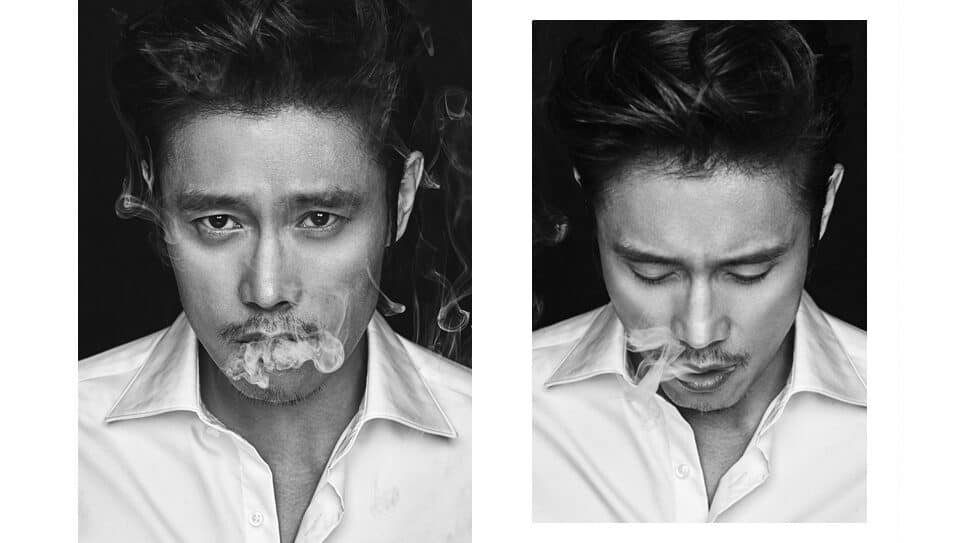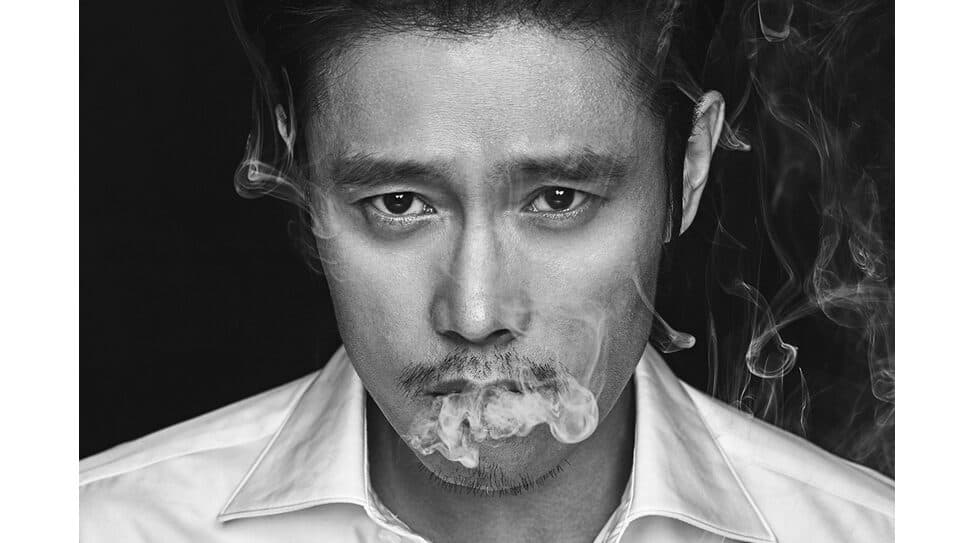My father never got to see me in Hollywood films because he passed away in 1999, but I know he’s watching me. Breaking into Hollywood wasn’t just my dream—it was a dream that we shared.
Lee Byung-hun has been called “the James Dean of Asia” and “the South Korean Tom Cruise” over the years—not by anyone in Asia, presumably, but that’s beside the point. The point is that, as a yardstick, a measure of comparable, towering fame was necessary in order to catapult the actor into Hollywood’s impenetrable fortress. “When I started my career in the nineties, Hallyu—the Korean Wave—didn’t exist, and the idea of working in Hollywood was a fantasy,” Lee recalls. “When the opportunity to work in Hollywood later became a reality, I remember thinking, ‘Wouldn’t it be better to try it and regret it than not to try it and regret it?’ So that’s what I did.”
Lee, now 53, takes us back in time to his childhood in Seoul, 1974: “My father was the first person to take me to the movies when I was four. He was a contractor and a very busy man, but all his life, he had a deep love of films, especially Hollywood films. He would take me to the movies every chance he got. When I think back to my childhood, I have many memories of watching westerns with my father. He was the biggest fan. I was too young to understand what they were about, but all those films planted a seed in me that later grew and led me to becoming an actor. My father never got to see me in Hollywood films because he passed away in 1999, but I know he’s watching me. Breaking into Hollywood wasn’t just my dream—it was a dream that we shared.”
In 2009, Lee made his Hollywood debut as Storm Shadow in G.I. Joe: The Rise of Cobra, on the back of his Cannes Film Festival breakout performance in the “kimchi western” The Good, the Bad, the Weird—Korea’s biggest production ever at the time—a boisterous homage to Sergio Leone in which Lee plays a crazy-eyed bandit. Prior to that, he had headlined 2000’s Joint Security Area, which broke every possible box office record in Korea at the time. He would go on to star in more Hollywood titles, including G.I. Joe: Retaliation, RED 2, and The Magnificent Seven remake.
Lee’s casting choice as the Front Man in Squid Game is in some ways symbolic. Taken quite literally, what does it mean for him to be at the front? For the series’ doomed contestants, being first meant everything, but inherently risky without a blueprint. It stirs echoes of Lee’s blindfolded stab at Hollywood, which saw him come out the other side with riches. “Following a path that’s already been taken may be comfortable, but there’s no adventure in that,” Lee explains. He’s the first Korean actor to leave his handprints at the Grauman’s Chinese and the first Korean actor to present an award at the Oscars. Lee is Asia’s James Dean. Korea’s Tom Cruise. Korea’s frontman.
It isn’t surprising, either, that Lee might want to explore a character’s rise through the ranks in another crazy-eyed turn with Concrete Utopia, a post-apocalyptic parable centered around a massive earthquake that decimates Seoul, save for one apartment complex—the centerpiece onto which the film affixes its interrogation of humanity and socioeconomic disparities in a time of unthinkable catastrophe. Told through the eyes of a handful of survivors, rules are redefined and reinterpreted on the road to creating a new social order, and we’re witness to the different, if not widely conflicting, moral compasses of its central characters. Among them is Yeong-tak (Lee), who’s unanimously appointed by a provisional committee to serve as their “resident delegate,” tasked with mapping a path forward after proving his bravery to them, fearlessly rushing into a burning unit to put out the blaze. Under his questionable leadership, which skews violently in one ideological extreme, they vote to expel all non-original residents of the complex—”refugees”—essentially sentencing them to death in the elements. Initially portrayed as a timid and awkward outcast incapable of asserting himself, Yeong-tak gradually transforms into a murderous tyrant.
“It’s interesting how people transform in extreme situations,” says Lee. “This is a man who has lost everything. He has lost his family and his home. He has lost the will to live. It is under these dark circumstances that he’s thrust into a leadership role, which, little by little, begins to overtake him. He’s overwhelmed by his new power. He becomes obsessed with it. And he is as well intentioned at moments as he is irredeemably destructive. He is neither good or bad. This is the gray area we most wanted to explore. It’s a question we most wanted to ask viewers: how would you behave?”
Concrete Utopia was this summer’s box office sensation back home and is now the country’s official submission for the next Best International Feature Film race at the 2024 Academy Awards.
So what is it about K-content? We’ve all heard this before: “I’ve never seen anything like this.” What sets something like Oldboy, I Saw the Devil, Train to Busan, Parasite, and Decision to Leave apart from other world cinemas? Lee has his own theory: “I think we can find some clues from how I was influenced growing up. My childhood was filled with American westerns and black-and-white films. My elementary school days were all about Chinese movies and Hong Kong noir featuring Jackie Chan and Bruce Lee. In my teenage years, I was immersed in Japanese films, anime, and all genres of American film. I think that maybe Korean culture has grown much like I have: being influenced by a wide array of cultures due to its geographical and historical characteristics. We embraced and accepted the strengths of various cultures without prejudice, and those inspirations met with our own culture to change and become something powerful and competitive and uniquely Korean. It’s about not fitting into a mold, not letting go of what is pure.”
On the horizon for Lee is the hugely anticipated second season of Squid Game. In the downtime between the series’ two seasons, fans have come up with theories about where the story might be headed. However, Lee is quick to debunk all of them: “I’ve read lots of speculative articles and none of them have come even close.” The first table read for the next round was in June and production is underway, but a release date has yet to be announced by Netflix. “It’s a show that originally wasn’t intended to have a second season so I was amazed at how fun the scripts were,” Lee teases. “I’m the Front Man and all I can say is that he’s the furthest thing from being pure.”
Korea is Netflix’s biggest single territory spend within Asia and the streamer announced in April that it’s planning to spend $2.5 billion on Korean content across the next four years, on top of the more than $1 billion already spent since 2016. All things considered, that spend is a no-brainer.
Concrete Utopia opens in NYC and LA on December 8, and goes nationwide on December 15.



 A Conversation with Sean Wang
A Conversation with Sean Wang A Conversation with James Paxton
A Conversation with James Paxton
No Comments